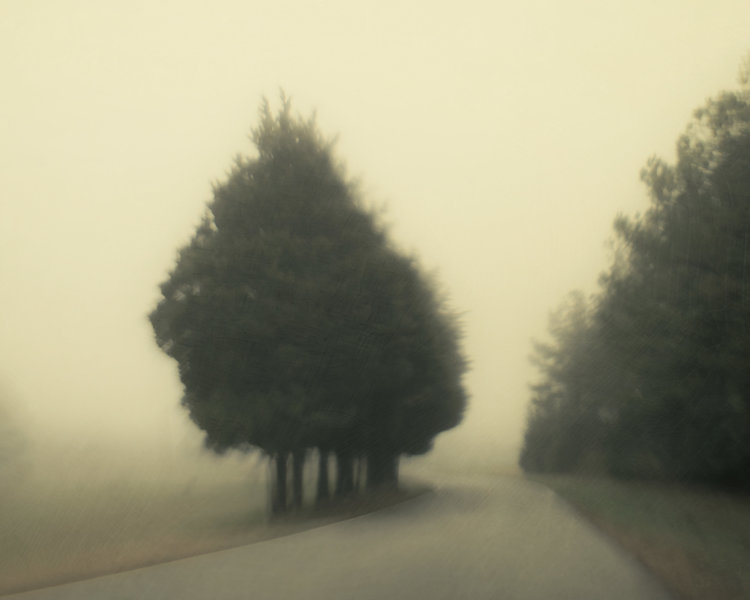
“The Places We Hide,” Image by Dawn Surratt
Liam walked down the hill from the rented cottage and along by the churchyard wall. He felt a pinprick bite on his ear and looked up. A column of gnats hung over him in the evening air like an unclear thought.
Opposite the village green, several youngsters were skateboarding down the sloping concrete apron in front of the pub, aiming themselves at one another and only changing course at the very last moment. The lone girl taking part dipped and swerved with particular grace, redistributing her weight with fluid movements of her arms, hips and feet, her pony-tailed ringlets flying. She reminded Liam of a girl surfer he and Justine had watched in Cornwall the September before. How envious he had been of the way the girl laughed to herself as she splashed out of the ocean and walked back up the beach, her eyebrows and lips white with sea-salt. After dropping her board on the sand, she shook her arms and legs in a shivering dance, shouting out that the water was “Tit-freezing cold.” It hadn’t been easy to look away from the elastic curves of her wet suit, the long zip an invitation – drawing it down like peeling a fruit.
“So all the tales about men in middle-age are true,” Justine teased him later, having followed his eyes. “I want to make it absolutely clear that I won’t wear rubber for you no matter how nicely you ask.”
The village telephone-box was of the old-fashioned sort, the exterior pitted and scabbed with layer upon layer of red paint. Its battered appearance and survival into another time seemed almost stubborn. Perhaps there was a kind of liberty in being overlooked, in being allowed your own history, your own lost world? Opening the door, he remembered the Japanese soldier who, when rescued from a lonely Pacific island twenty years after VJ-Day, refused to believe that the war was over and his country had been defeated.
Even on a summer evening the box’s interior was redolent of urine and wet wool, of shelter on dark, rainy days. There was a dead matchstick, a Kit-Kat wrapper and a wizened brown apple-core on the shelf beside the receiver. On the floor there was a sooty mark where somebody (the parish pyromaniac?) had unaccountably tried to build a fire.
“Oh it’s you,” Justine answered. The disdain in her voice sounded vengeful, a weapon readied in advance.
“Don’t get too enthusiastic, now,” he said.
“I won’t.”
“Expecting a more attractive offer, is that it?”
“And you’d care, I suppose.”
Liam stepped back into the life he used to live. He asked how her preparation for the new teaching term was progressing; if there had been a call or letter from Davy; how she was coping with the bills; if the garden was getting overrun; whether her car was going okay. As he spoke, he listened to what he was saying as a stranger might listen. It was eerie, the feeling of being on the outside, at a distance, eerier yet to discover he was able to talk across that distance. Here was here and there was there.
Justine’s replies were listless, resentful. “Feel easier now, do you?” she said when his questions began to falter. “Feel everything at home is all right so you can go on exactly as you are, go on treating me the way you’re treating me? I don’t have to stand for this, you know. I might be a fool for you, but I’m not a fool. If you think I don’t have what it takes to carry on on my own then you’re wrong. If I have to manage I will, so don’t kid yourself on that score. You never know, keep on as you are and you could well find there’s nothing for you to come back to.”
Liam allowed her to run on, to get it all out. “None of what’s gone on has been about you,” he said when she had finished. “You know that.”
“Thanks a lot.”
“Don’t pretend to misunderstand. I feel bad enough as it is.”
“Do you?”
“You’ve been very patient.”
Her laughter was bitter. “What choice have I had.”
“I’m sorry.”
“Are you?”
“How can you ask that?”
His certainty seemed to take her by surprise. There was a pause.
“What’s wrong?” he asked.
“You sound different,” she said.
“Do I?”
“Yes. More in control.”
It was Liam’s turn to laugh now.
“Does that mean you’re not?” she said.
“Perhaps.”
Justine sighed to herself. “You haven’t got three wishes. You’re who you are now. Nothing stays the same. You’ll have to come to terms with it eventually,” she said.
“I know.”
“You agree?”
“Of course I do. I’m not stupid.”
There was another pause.
“Are you still there?” Liam asked.
“Yes.”
“You’ve gone very quiet.”
Tom Saunders, an award winning writer has a novel Inappropriate Happiness and two collections of short stories, Brother, What Strange Place is This? and Roof Whirl Away, , as well as his poetry collection To the Boy, available in print and on Kindle at Amazon UK and USA. They can also be directly purchased from the Reuben Books website. He has an MA in Creative Writing from the University of East Anglia, has been nominated for two Pushcart Prizes, appeared in many anthologies, and is an ardent photographer in the UK where he lives.

Pingback: Contributors Fall 2016 | Rkvry Quarterly Literary Journal